英语常见俚语
- 格式:pdf
- 大小:341.41 KB
- 文档页数:10
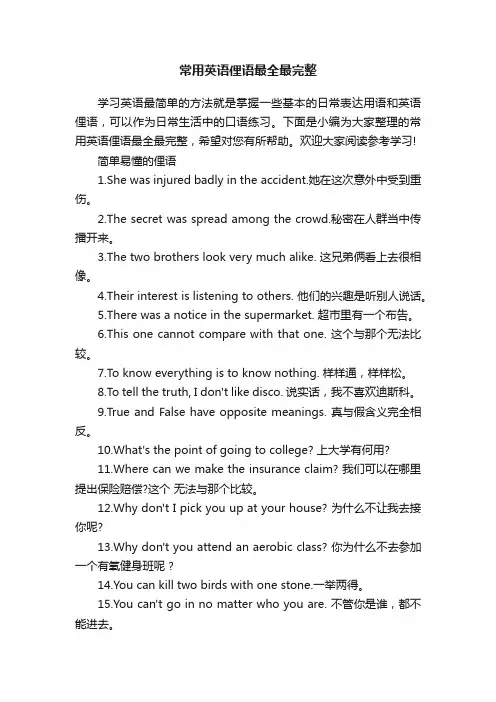
常用英语俚语最全最完整学习英语最简单的方法就是掌握一些基本的日常表达用语和英语俚语,可以作为日常生活中的口语练习。
下面是小编为大家整理的常用英语俚语最全最完整,希望对您有所帮助。
欢迎大家阅读参考学习!简单易懂的俚语1.She was injured badly in the accident.她在这次意外中受到重伤。
2.The secret was spread among the crowd.秘密在人群当中传播开来。
3.The two brothers look very much alike. 这兄弟俩看上去很相像。
4.Their interest is listening to others. 他们的兴趣是听别人说话。
5.There was a notice in the supermarket. 超市里有一个布告。
6.This one cannot compare with that one. 这个与那个无法比较。
7.To know everything is to know nothing. 样样通,样样松。
8.To tell the truth, I don't like disco. 说实话,我不喜欢迪斯科。
9.True and False have opposite meanings. 真与假含义完全相反。
10.What's the point of going to college? 上大学有何用?11.Where can we make the insurance claim? 我们可以在哪里提出保险赔偿?这个无法与那个比较。
12.Why don't I pick you up at your house? 为什么不让我去接你呢?13.Why don't you attend an aerobic class? 你为什么不去参加一个有氧健身班呢 ?14.You can kill two birds with one stone.一举两得。
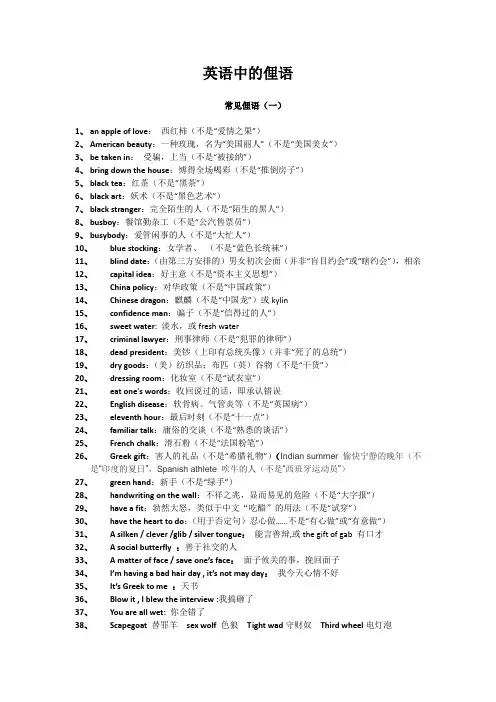
英语中的俚语常见俚语(一)1、an apple of love:西红柿(不是“爱情之果”)2、American beauty:一种玫瑰,名为“美国丽人”(不是“美国美女”)3、be taken in:受骗,上当(不是“被接纳”)4、bring down the house:博得全场喝彩(不是“推倒房子”)5、black tea:红茶(不是“黑茶”)6、black art:妖术(不是“黑色艺术”)7、black stranger:完全陌生的人(不是“陌生的黑人”)8、busboy:餐馆勤杂工(不是“公汽售票员”)9、busybody:爱管闲事的人(不是“大忙人”)10、blue stocking:女学者、(不是“蓝色长统袜”)11、blind date:(由第三方安排的)男女初次会面(并非“盲目约会”或“瞎约会”),相亲12、capital idea:好主意(不是“资本主义思想”)13、China policy:对华政策(不是“中国政策”)14、Chinese dragon:麒麟(不是“中国龙”)或kylin15、confidence man:骗子(不是“信得过的人”)16、sweet water: 淡水,或fresh water17、criminal lawyer:刑事律师(不是“犯罪的律师”)18、dead president:美钞(上印有总统头像)(并非“死了的总统”)19、dry goods:(美)纺织品;布匹(英)谷物(不是“干货”)20、dressing room:化妆室(不是“试衣室”)21、eat one's words:收回说过的话,即承认错误22、English disease:软骨病。
气管炎等(不是“英国病”)23、eleventh hour:最后时刻(不是“十一点”)24、familiar talk:庸俗的交谈(不是“熟悉的谈话”)25、French chalk:滑石粉(不是“法国粉笔”)26、Greek gift:害人的礼品(不是“希腊礼物”)(Indian summer 愉快宁静的晚年(不是“印度的夏日”,Spanish athlete 吹牛的人(不是“西班牙运动员”)27、green hand:新手(不是“绿手”)28、handwriting on the wall:不祥之兆,显而易见的危险(不是“大字报”)29、have a fit:勃然大怒,类似于中文“吃醋”的用法(不是“试穿”)30、have the heart to do:(用于否定句)忍心做……不是“有心做”或“有意做”)31、 A silken / clever /glib / silver tongue:能言善辩,或the gift of gab 有口才32、 A social butterfly :善于社交的人33、 A matter of face / save one’s face:面子攸关的事,挽回面子34、I’m having a bad hair day , it’s not may day:我今天心情不好35、It’s Greek to me :天书36、Blow it , I blew the interview :我搞砸了37、You are all wet: 你全错了38、Scapegoat替罪羊sex wolf 色狼Tight wad守财奴Third wheel电灯泡常见俚语(二)Don’t miss the boat 不要错失良机Don’t take it for granted 认为理所当然Don’t get me wrong 别误会我,冤枉我Play it by ears 到时候再说,随机行事It’s up in the air 还没定下来的事May I take a rain check? 改期,下次好吗?Red neck, bumpkin , rustic, countryman乡下人,(villain,坏人,恶棍,歹徒,反派人物)Go down to business, return to our mutton 言归正传The shoes were on the other foot 时过境迁You are a chicken 你是胆小鬼You are a hot chick 你很火辣No sweet without sweat 一份耕耘一份收获Cold shoulder’拒绝,冷遇Cold feet 害怕,胆怯Cold turkey 冷血动物Lose my shirt 一无所有I am broke我没钱了,破产了Hold your horses 耐心点Hit books 读书Doggy bag 打包袋。
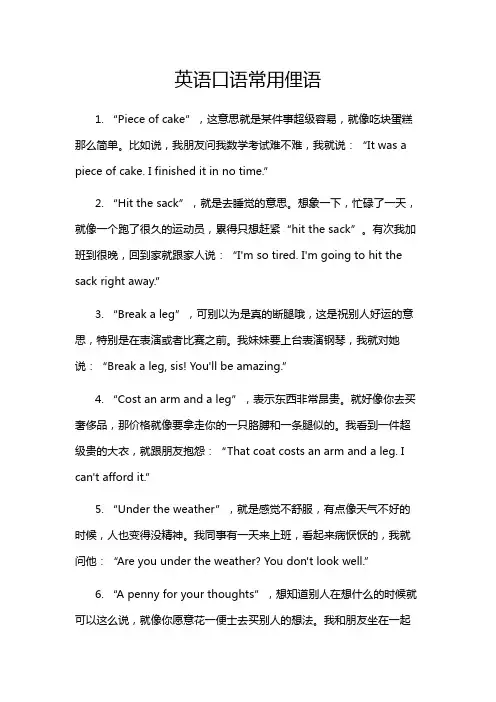
英语口语常用俚语1. “Piece of cake”,这意思就是某件事超级容易,就像吃块蛋糕那么简单。
比如说,我朋友问我数学考试难不难,我就说:“It was a piece of cake. I finished it in no time.”2. “Hit the sack”,就是去睡觉的意思。
想象一下,忙碌了一天,就像一个跑了很久的运动员,累得只想赶紧“hit the sack”。
有次我加班到很晚,回到家就跟家人说:“I'm so tired. I'm going to hit the sack right away.”3. “Break a leg”,可别以为是真的断腿哦,这是祝别人好运的意思,特别是在表演或者比赛之前。
我妹妹要上台表演钢琴,我就对她说:“Break a leg, sis! You'll be amazing.”4. “Cost an arm and a leg”,表示东西非常昂贵。
就好像你去买奢侈品,那价格就像要拿走你的一只胳膊和一条腿似的。
我看到一件超级贵的大衣,就跟朋友抱怨:“That coat costs an arm and a leg. I can't afford it.”5. “Under the weather”,就是感觉不舒服,有点像天气不好的时候,人也变得没精神。
我同事有一天来上班,看起来病恹恹的,我就问他:“Are you under the weather? You don't look well.”6. “A penny for your thoughts”,想知道别人在想什么的时候就可以这么说,就像你愿意花一便士去买别人的想法。
我和朋友坐在一起发呆,我就笑着对他说:“A penny for your thoughts. What are you thinking about?”7. “Let the cat out of the bag”,意思是泄露秘密。
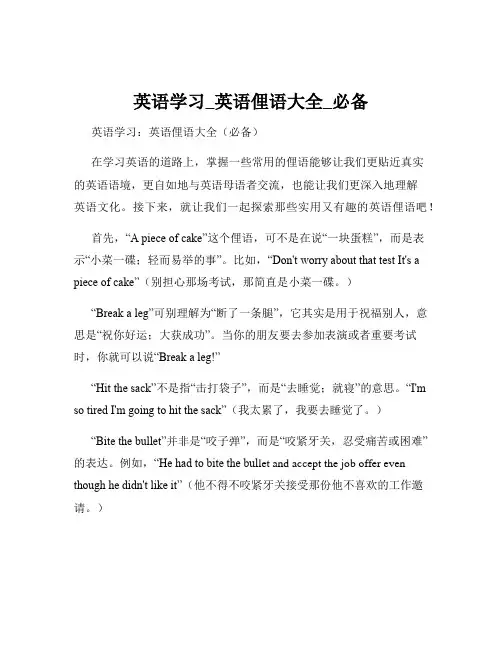
英语学习_英语俚语大全_必备英语学习:英语俚语大全(必备)在学习英语的道路上,掌握一些常用的俚语能够让我们更贴近真实的英语语境,更自如地与英语母语者交流,也能让我们更深入地理解英语文化。
接下来,就让我们一起探索那些实用又有趣的英语俚语吧!首先,“A piece of cake”这个俚语,可不是在说“一块蛋糕”,而是表示“小菜一碟;轻而易举的事”。
比如,“Don't worry about that test It's a piece of cake”(别担心那场考试,那简直是小菜一碟。
)“Break a leg”可别理解为“断了一条腿”,它其实是用于祝福别人,意思是“祝你好运;大获成功”。
当你的朋友要去参加表演或者重要考试时,你就可以说“Break a leg!”“Hit the sack”不是指“击打袋子”,而是“去睡觉;就寝”的意思。
“I'm so tired I'm going to hit the sack”(我太累了,我要去睡觉了。
)“Bite the bullet”并非是“咬子弹”,而是“咬紧牙关,忍受痛苦或困难”的表达。
例如,“He had to bite the bul let and accept the job offer even though he didn't like it”(他不得不咬紧牙关接受那份他不喜欢的工作邀请。
)“Cost an arm and a leg”不要按照字面理解为“花费一只胳膊和一条腿”,它意味着“价格昂贵;代价很高”。
“That designer dress costs an arm and a leg”(那件设计师裙子价格昂贵。
)“Under the weather”不是在说“在天气之下”,而是表示“身体不适;不舒服”。
“I'm feeling a bit under the weather today”(我今天感觉有点不舒服。
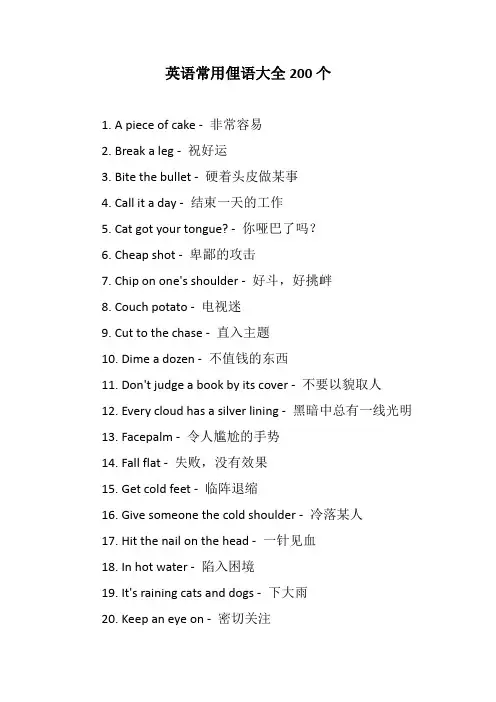
英语常用俚语大全200个1. A piece of cake -非常容易2. Break a leg -祝好运3. Bite the bullet -硬着头皮做某事4. Call it a day -结束一天的工作5. Cat got your tongue? -你哑巴了吗?6. Cheap shot -卑鄙的攻击7. Chip on one's shoulder -好斗,好挑衅8. Couch potato -电视迷9. Cut to the chase -直入主题10. Dime a dozen -不值钱的东西11. Don't judge a book by its cover -不要以貌取人12. Every cloud has a silver lining -黑暗中总有一线光明13. Facepalm -令人尴尬的手势14. Fall flat -失败,没有效果15. Get cold feet -临阵退缩16. Give someone the cold shoulder -冷落某人17. Hit the nail on the head -一针见血18. In hot water -陷入困境19. It's raining cats and dogs -下大雨20. Keep an eye on -密切关注21. Last but not least -最后但并非最不重要的22. Let the cat out of the bag -泄露秘密23. Lost in translation -无法理解24. Make a long story short -长话短说25. No pain, no gain -不劳无获26. On cloud nine -非常高兴27. Out of the blue -突然,出乎意料28. Pull someone's leg -开玩笑,愚弄某人29. Put all your eggs in one basket -孤注一掷30. See eye to eye -意见一致31. Take a rain check -改天再约32. The ball is in your court -轮到你出招了33. Under the weather -不舒服,生病34. When pigs fly -不可能的事情35. Whistle while you work -边工作边吹口哨36. You are what you eat -人如其食37. Bite off more than you can chew -贪多嚼不烂38. Burn the midnight oil -熬夜学习或工作39. Call it quits -停止,放弃40. Cost an arm and a leg -非常昂贵41. Drop the ball -失职,疏忽42. Go bananas -发疯,失去理智43. Hit the sack -去睡觉44. In a pickle -陷入困境45. Kill two birds with one stone -一石二鸟46. Lay low -保持低调,避免引起注意47. Let sleeping dogs lie -勿揭人疮疤,勿惹麻烦48. Mind your own business -管好自己的事情49. Once in a blue moon -千载难逢,很少发生50. Play it by ear -随机应变,看情况行事51. Pull yourself together -振作起来,恢复精神52. Put up or shut up -要么行动,要么闭嘴53. Seen better days -过去的好日子,现在不如以前54. Stick to your guns -坚持自己的立场和观点55. Take the bull by the horns -勇敢面对困难,迎难而上56. Talk back to someone who deserves it -反驳应得的人57. The early bird catches the worm -早起的鸟儿有虫吃58. Time flies when you're having fun -快乐时光过得飞快59. To be up in arms about something -对某事非常生气或不满60. What's the catch? -还有别的条件吗?有什么陷阱?61. When pigs fly! -这是绝对不可能的!62. A blessing in disguise -塞翁失马,焉知非福63. Barking up the wrong tree -找错了目标,误解了事实64. Beat around the bush -拐弯抹角,旁敲侧击65. Better late than never -迟做总比不做好66. Break a leg! -祝你好运!(演员常说的祝福语)67. Butter someone up -讨好某人,拍马屁68. By the skin of one's teeth -勉强成功,险些失败69. Call it a day job! -这是一份日结的工作!(讽刺工作无聊、低薪)70. Cold turkey -突然戒掉某种习惯或瘾症71. Cut corners -偷工减料,走捷径72. Dead ringer for someone/something -与某人/某物极为相似73. Don't count your chickens before they hatch! -别高兴得太早!(事情还没成定局)74. Every cloud has a silver lining! -每朵乌云都有银边!(坏事中总有好事)75. Get cold feet! -我害怕了!(临阵退缩)76. Hit the hay! -该睡觉了!77. In hot water! -陷入困境!78. Keep an eye on the ball! -注意看球!79. Last but not least, good luck! -最后但同样重要的是,祝你好运!80. Let the cat out of the bag! -泄露秘密!81. Lost in translation! -无法理解!82. Make a long story short, I'm sorry! -长话短说,我很抱歉!83. No pain, no gain! -不劳无获!84. On cloud nine! -非常高兴!85. Out of the blue! -突然发生!86. Pull someone's leg! -开玩笑!87. Put all your eggs in one basket! -孤注一掷!88. See eye to eye! -意见一致!89. Take a rain check! -改天再约!90. The ball is in your court! -轮到你了!91. Under the weather! -不舒服!92. When pigs fly! -不可能的事情!93. Whistle while you work! -边工作边吹口哨!94. You are what you eat! -你就是你吃的东西!95. Bite off more than you can chew! -贪多嚼不烂!96. Burn the midnight oil! -熬夜学习或工作!97. Call it quits! -停止,放弃!98. Cost an arm and a leg! -非常昂贵!99. Drop the ball! -失职,疏忽!100. Go bananas! -发疯,失去理智!101. Hit the sack! -去睡觉!102. In a pickle! -陷入困境!103. Kill two birds with one stone! -一石二鸟!104. Lay low! -保持低调,避免引起注意!105. Let sleeping dogs lie! -勿揭人疮疤,勿惹麻烦!106. Mind your own business! -管好自己的事情!107. Once in a blue moon! -千载难逢,很少发生!108. Play it by ear! -随机应变,看情况行事!109. Pull yourself together! -振作起来,恢复精神!110. Put up or shut up! -要么行动,要么闭嘴!111. Seen better days! -过去的好日子,现在不如以前!112. Stick to your guns! -坚持自己的立场和观点!113. Take the bull by the horns! -勇敢面对困难,迎难而上!114. Talk back to someone who deserves it! -反驳应得的人!115. The early bird catches the worm! -早起的鸟儿有虫吃!116. To be up in arms about something! -对某事非常生气或不满!117. What's the catch? -还有别的条件吗?有什么陷阱?118. When pigs fly! -这是绝对不可能的!119. A blessing in disguise! -塞翁失马,焉知非福!120. Barking up the wrong tree! -找错了目标,误解了事实!121. Beat around the bush! -拐弯抹角,旁敲侧击!122. Better late than never! -迟做总比不做好!123. Break a leg! -祝你好运!(演员常说的祝福语)124. Butter someone up! -讨好某人,拍马屁!125. By the skin of one's teeth! -勉强成功,险些失败!126. Call it a day job! -这是一份日结的工作!(讽刺工作无聊、低薪)127. Cold turkey! -突然戒掉某种习惯或瘾症!128. Cut corners! -偷工减料,走捷径!129. Dead ringer for someone/something! -与某人/某物极为相似!130. Don't count your chickens before they hatch! -别高兴得太早!(事情还没成定局)131. Every cloud has a silver lining! -每朵乌云都有银边!(坏事中总有好事)132. Get cold feet! -我害怕了!(临阵退缩)133. Keep an eye on the ball! -注意看球!134. Last but not least, good luck! -最后但同样重要的是,祝你好运!135. Let the cat out of the bag! -泄露秘密!136. Lost in translation! -无法理解!137. Make a long story short, I'm sorry! -长话短说,我很抱歉!138. No pain, no gain! -不劳无获!139. On cloud nine! -非常高兴!140. Out of the blue! -突然发生!141. Pull someone's leg! -开玩笑!142. Put all your eggs in one basket! -孤注一掷!143. See eye to eye! -意见一致!144. Take a rain check! -改天再约!145. The ball is in your court! -轮到你了!146. Under the weather! -不舒服!147. When pigs fly! -不可能的事情!148. Whistle while you work! -边工作边吹口哨!149. You are what you eat! -你就是你吃的东西!150. Bite off more than you can chew! -贪多嚼不烂!151. Burn the midnight oil! -熬夜学习或工作!152. Call it quits! -停止,放弃!153. Cost an arm and a leg! -非常昂贵!154. Drop the ball! -失职,疏忽!155. Go bananas! -发疯,失去理智!156. Hit the sack! -去睡觉!157. In a pickle! -陷入困境!158. Kill two birds with one stone! -一石二鸟!159. Lay low! -保持低调,避免引起注意!160. Let sleeping dogs lie! -勿揭人疮疤,勿惹麻烦!161. Mind your own business! -管好自己的事情!162. Once in a blue moon! -千载难逢,很少发生!163. Play it by ear! -随机应变,看情况行事!164. Pull yourself together! -振作起来,恢复精神!165. Put up or shut up! -要么行动,要么闭嘴!166. Seen better days! -过去的好日子,现在不如以前!167. Stick to your guns! -坚持自己的立场和观点!168. Take the bull by the horns! -勇敢面对困难,迎难而上!169. Talk back to someone who deserves it! -反驳应得的人!170. The early bird catches the worm! -早起的鸟儿有虫吃!171. To be up in arms about something! -对某事非常生气或不满!172. What's the catch? -还有别的条件吗?有什么陷阱?173. When pigs fly! -这是绝对不可能的!174. A blessing in disguise! -塞翁失马,焉知非福!175. Barking up the wrong tree! -找错了目标,误解了事实!176. Beat around the bush! -拐弯抹角,旁敲侧击!177. Better late than never! -迟做总比不做好!178. Break a leg! -祝你好运!(演员常说的祝福语)179. Butter someone up! -讨好某人,拍马屁!180. By the skin of one's teeth! -勉强成功,险些失败!181. Call it a day job! -这是一份日结的工作!(讽刺工作无聊、低薪)182. Cold turkey! -突然戒掉某种习惯或瘾症!183. Cut corners! -偷工减料,走捷径!184. Dead ringer for someone/something! -与某人/某物极为相似!185. Don't count your chickens before they hatch! -别高兴得太早!(事情还没成定局)186. Every cloud has a silver lining! -每朵乌云都有银边!(坏事中总有好事)187. Get cold feet! -我害怕了!(临阵退缩)188. Keep an eye on the ball! -注意看球!189. Last but not least, good luck! -最后但同样重要的是,祝你好运!190. Let the cat out of the bag! -泄露秘密!191. Lost in translation! -无法理解!192. Make a long story short, I'm sorry! -长话短说,我很抱歉!193. No pain, no gain! -不劳无获!194. On cloud nine! -非常高兴!195. Out of the blue! -突然发生!196. Pull someone's leg! -开玩笑!197. Put all your eggs in one basket! -孤注一掷!198. See eye to eye! -意见一致!199. Take a rain check! -改天再约!200. The ball is in your court! -轮到你了!。
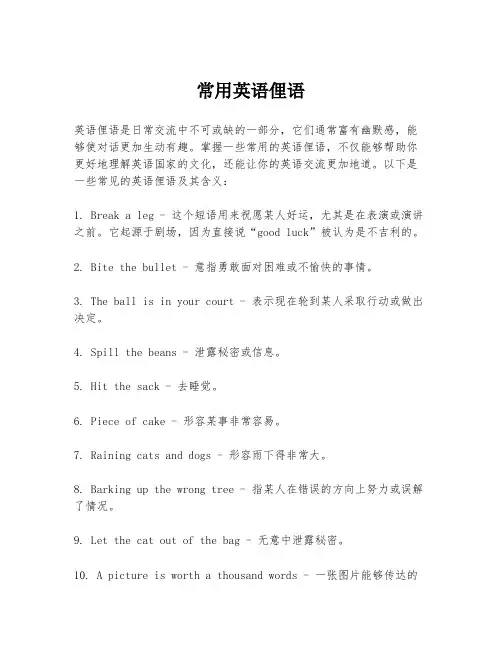
常用英语俚语英语俚语是日常交流中不可或缺的一部分,它们通常富有幽默感,能够使对话更加生动有趣。
掌握一些常用的英语俚语,不仅能够帮助你更好地理解英语国家的文化,还能让你的英语交流更加地道。
以下是一些常见的英语俚语及其含义:1. Break a leg - 这个短语用来祝愿某人好运,尤其是在表演或演讲之前。
它起源于剧场,因为直接说“good luck”被认为是不吉利的。
2. Bite the bullet - 意指勇敢面对困难或不愉快的事情。
3. The ball is in your court - 表示现在轮到某人采取行动或做出决定。
4. Spill the beans - 泄露秘密或信息。
5. Hit the sack - 去睡觉。
6. Piece of cake - 形容某事非常容易。
7. Raining cats and dogs - 形容雨下得非常大。
8. Barking up the wrong tree - 指某人在错误的方向上努力或误解了情况。
9. Let the cat out of the bag - 无意中泄露秘密。
10. A picture is worth a thousand words - 一张图片能够传达的信息比千言万语还要多。
11. You can't judge a book by its cover - 不能仅凭外表来判断事物。
12. Don't put all your eggs in one basket - 不要把所有资源或希望都放在一个地方,要分散风险。
13. The early bird catches the worm - 早起的鸟儿有虫吃,意指早起的人能够获得更多的机会或好处。
14. A penny for your thoughts - 询问某人在想什么,通常在对方看起来沉思时使用。
15. Out of the frying pan and into the fire - 从一个困境跳到另一个更糟的困境。
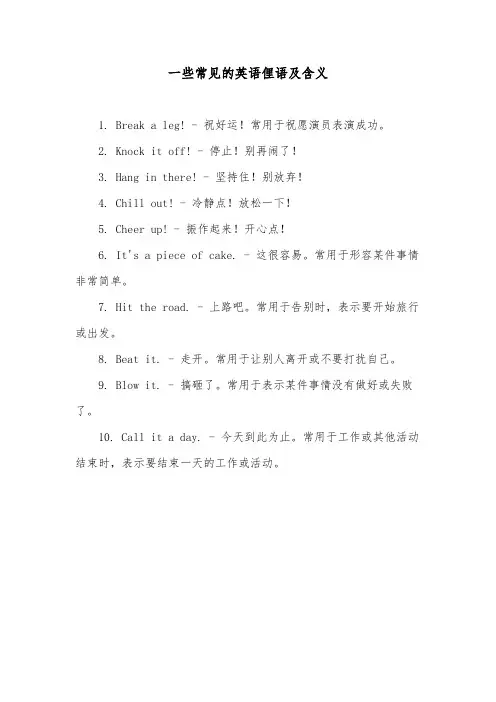
一些常见的英语俚语及含义
1. Break a leg! - 祝好运!常用于祝愿演员表演成功。
2. Knock it off! - 停止!别再闹了!
3. Hang in there! - 坚持住!别放弃!
4. Chill out! - 冷静点!放松一下!
5. Cheer up! - 振作起来!开心点!
6. It's a piece of cake. - 这很容易。
常用于形容某件事情非常简单。
7. Hit the road. - 上路吧。
常用于告别时,表示要开始旅行或出发。
8. Beat it. - 走开。
常用于让别人离开或不要打扰自己。
9. Blow it. - 搞砸了。
常用于表示某件事情没有做好或失败了。
10. Call it a day. - 今天到此为止。
常用于工作或其他活动结束时,表示要结束一天的工作或活动。
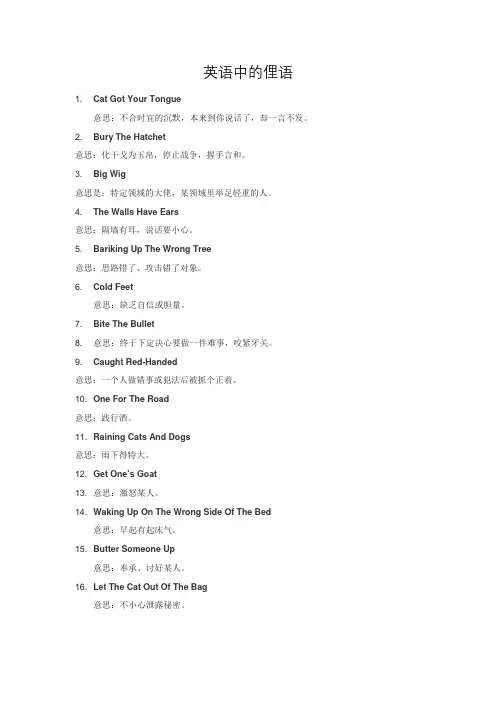
英语中的俚语
1. Cat Got Your Tongue
意思:不合时宜的沉默,本来到你说话了,却一言不发。
2. Bury The Hatchet
意思:化干戈为玉帛,停止战争,握手言和。
3. Big Wig
意思是:特定领域的大佬,某领域里举足轻重的人。
4. The Walls Have Ears
意思:隔墙有耳,说话要小心。
5. Bariking Up The Wrong Tree
意思:思路错了、攻击错了对象。
6. Cold Feet
意思:缺乏自信或胆量。
7. Bite The Bullet
8. 意思:终于下定决心要做一件难事,咬紧牙关。
9. Caught Red-Handed
意思:一个人做错事或犯法后被抓个正着。
10. One For The Road
意思:践行酒。
11. Raining Cats And Dogs
意思:雨下得特大。
12. Get One’s Goat
13. 意思:激怒某人。
14. Waking Up On The Wrong Side Of The Bed
意思:早起有起床气。
15. Butter Someone Up
意思:奉承、讨好某人。
16. Let The Cat Out Of The Bag
意思:不小心泄露秘密。
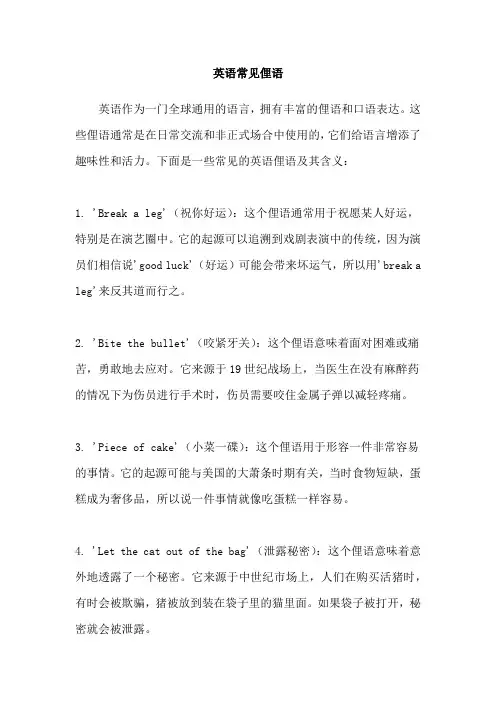
英语常见俚语英语作为一门全球通用的语言,拥有丰富的俚语和口语表达。
这些俚语通常是在日常交流和非正式场合中使用的,它们给语言增添了趣味性和活力。
下面是一些常见的英语俚语及其含义:1. 'Break a leg'(祝你好运):这个俚语通常用于祝愿某人好运,特别是在演艺圈中。
它的起源可以追溯到戏剧表演中的传统,因为演员们相信说'good luck'(好运)可能会带来坏运气,所以用'break a leg'来反其道而行之。
2. 'Bite the bullet'(咬紧牙关):这个俚语意味着面对困难或痛苦,勇敢地去应对。
它来源于19世纪战场上,当医生在没有麻醉药的情况下为伤员进行手术时,伤员需要咬住金属子弹以减轻疼痛。
3. 'Piece of cake'(小菜一碟):这个俚语用于形容一件非常容易的事情。
它的起源可能与美国的大萧条时期有关,当时食物短缺,蛋糕成为奢侈品,所以说一件事情就像吃蛋糕一样容易。
4. 'Let the cat out of the bag'(泄露秘密):这个俚语意味着意外地透露了一个秘密。
它来源于中世纪市场上,人们在购买活猪时,有时会被欺骗,猪被放到装在袋子里的猫里面。
如果袋子被打开,秘密就会被泄露。
5. 'Hit the nail on the head'(一针见血):这个俚语表示说话或行动非常准确,完全击中要害。
它的起源可以追溯到中世纪,当时木匠用锤子将钉子准确地钉入木头中。
这些俚语只是英语语言中的冰山一角,还有很多其他有趣和常见的俚语。
学习和了解这些俚语能够帮助我们更好地理解和应用英语,使我们的交流更加自然和生动。
所以,如果你想提高你的英语口语技巧,不妨学习和掌握一些常见的俚语。
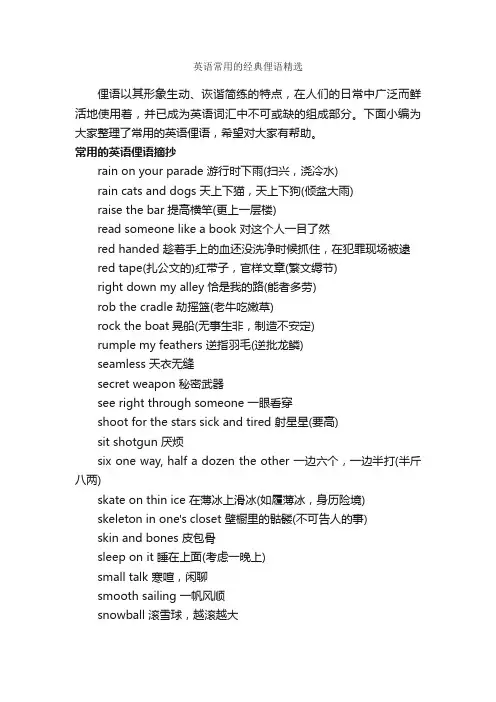
英语常用的经典俚语精选俚语以其形象生动、诙谐简练的特点,在人们的日常中广泛而鲜活地使用着,并已成为英语词汇中不可或缺的组成部分。
下面小编为大家整理了常用的英语俚语,希望对大家有帮助。
常用的英语俚语摘抄rain on your parade 游行时下雨(扫兴,浇冷水)rain cats and dogs 天上下猫,天上下狗(倾盆大雨)raise the bar 提高横竿(更上一层楼)read someone like a book 对这个人一目了然red handed 趁着手上的血还没洗净时候抓住,在犯罪现场被逮red tape(扎公文的)红带子,官样文章(繁文缛节)right down my alley 恰是我的路(能者多劳)rob the cradle 劫摇篮(老牛吃嫩草)rock the boat晃船(无事生非,制造不安定)rumple my feathers 逆指羽毛(逆批龙鳞)seamless 天衣无缝secret weapon 秘密武器see right through someone 一眼看穿shoot for the stars sick and tired 射星星(要高)sit shotgun 厌烦six one way, half a dozen the other 一边六个,一边半打(半斤八两)skate on thin ice 在薄冰上滑冰(如履薄冰,身历险境)skeleton in one's closet 壁橱里的骷髅(不可告人的事)skin and bones 皮包骨sleep on it 睡在上面(考虑一晚上)small talk 寒喧,闲聊smooth sailing 一帆风顺snowball 滚雪球,越滚越大snowball's chance in hell 雪球进了地狱(希望不大)spark 火星(来电)spineless 没脊梁(没有骨气)split hairs 细分头发(吹毛求疵)stab in the back 背后插刀(遭人暗算)stallion 千里驹(貌美体健的男人)stand someone up 对方失约,让人空等stick a fork in him, he"s done 用叉子戳他一下看看,他烤熟了吧stop and smell the roses 停下来闻玫瑰(享受生活)straw that broke the camel's back压断骆驼脊梁的稻草(最后致命的一击)straight from the horse's mouth 听马说的(根据最可靠的消息来源)strike out 三振出局stud 种马(貌美体健的男人)swing for the fence 打全垒打常用的英语俚语推荐get a foot in the door 一脚已经进了门里(获得立足点,占一份) get hitched 拴起来(结婚)get off on the wrong foot 起步便错(第一印象不佳)get the ball rolling 让球滚起来(动起手来)get/give the green light 绿灯亮了(获准行动)give the shirt off one"s back 连衬衫都肯脱给人(慷慨成性)go one step too far 多走了一步(做得太过分了)go out on a limb 爬高枝(担风险)go overboard 过火go to hell in a hand basket 坐着吊篮下地狱(一坏不可收拾)go to one"s head 上头上脸,冲昏头脑go under 沉没(破产)goose bumps 鸡皮疙瘩grasp for straws 抓稻草(绝望中的挣扎,快要淹死的人连漂浮的稻草也抓)guts 胆子常用的英语俚语精选empty nest 空巢(儿女长大离家)every cloud has a silver lining 乌云也有银边(祸兮福所倚,塞翁失马)fall into place 落实,就绪fender bender 撞弯保险杠的车祸(小车祸)fight tooth and nail 爪牙并施,拚命抵抗fine line 细线(微妙的差别)fish out of water 如鱼离水flash in the pan 淘金盆里的反光(空欢喜一场,好景不长)fork in the road 岔路framed 被陷害,遭栽赃full throttle 加足马力。
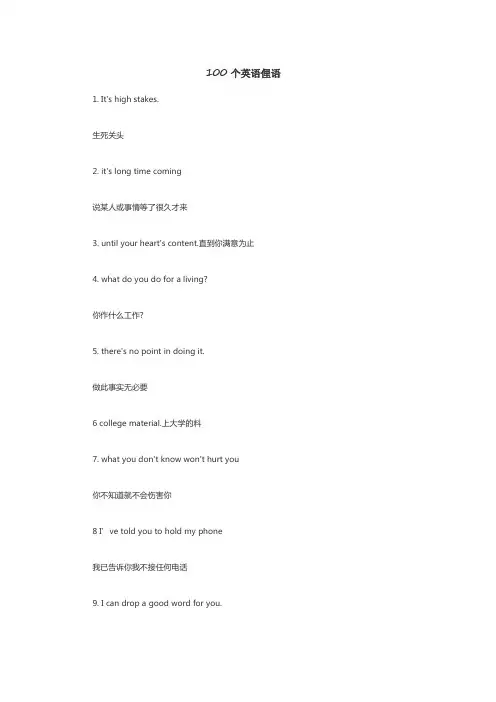
100个英语俚语1.It's high stakes.生死关头2. it's long time coming说某人或事情等了很久才来3. until your heart's content.直到你满意为止4. what do you do for a living?你作什么工作?5. there's no point in doing it.做此事实无必要6 college material.上大学的料7. what you don't know won't hurt you你不知道就不会伤害你8 I’ve told you to hold my phone我已告诉你我不接任何电话9. I can drop a good word for you.我可为你说句好话10. I am just a little on edge我只是有点紧张11.smart move 聪明之举12. she always stands me up.她总是放我鸽子13. cut somebody some slack.放某人一马14. He is very clockwork.他很守时。
15. He will never let us down.他从不让我们失望16. play one's part尽某人的本分17. put yourself in someone's shoes站在别人的角度去想一想18.thanks you are sweet.谢谢你人真好19. HOP IN/HOP OUT一种上下某种交通工具非常酷迅速的动作比如从窗而入20. have it with sb/sth 受够了某人、事eg I really have it with Tom21.get a crush on sb 迷上某人22. goof off(年轻人)一些无聊的事开玩笑23.to play hooky逃学或者装病不去上班24pple- polisher 马屁精25 as busy as a bee(象蜜蜂)忙忙碌碌的26 as graceful as a swan(象天鹅)姿态优雅的27as gentle as a lamb(象羊羔)性情温顺的28as cunning as a fox(象狐狸)一样狡猾的29.as poor as a church mouse 一贫如洗30.I’m beat.我非常疲乏。
常见的英语俚语汇总俚语是一种非正式的语言,通常用在非正式的场合。
有时俚语用以表达新鲜事物,或对旧事物赋以新的说法。
下面是小编给大家带来的俚语大全,欢迎大家来阅读参考,我们一起来看看吧。
常见的俚语汇总(一)1.beats me我不知道Beats me. We haven’t learned that.我不知道。
我们还没学过那个。
2.beat it走开Beat it! I’m busy right now.走开!我现在正忙着。
3.beat a dead horse白费口舌,白费力气I’ve already made up my mind. There’s no sensebeating a dead horse.我已经下了决心,不要再白费口舌了。
4.John Hancock签名Put your John Hancock right here.请在这里签名。
5.keep it under raps保密Don’t tell anyone about the party. Let’s just keep it under eraps.不要吧晚会的事告诉任何人。
这件事情不要泄漏出去。
6.kick around讨论;多考虑一下Let’s kick around a few more proposals before we come to a final decision.我们最后决定之前多考虑几个方案吧。
7.junkie吸毒者The junkie stole money in order to buy more drugs.这名吸毒者为了买更多的而偷钱。
8.put away大吃大喝I’ve never seen anybody put away so much food and still look so thin.我从未见过这么能吃的人还这么瘦。
9.put a move on挑逗He tried to put the moves on her, but she turned him down.他想要挑逗她,但她拒绝了他。
一些常见的英语俚语以下是30 个常见的英语俚语:•"Hit the books":用功读书•"Blow off":失约•"Kick back":放松•"Chill out":冷静下来•"Go ahead":去吧•"No way":不行•"Sure thing":当然•"In the meantime":与此同时•"What's up?":怎么了?•"It's a piece of cake":轻而易举•"Get real":现实点•"Sort of":有点儿•"You bet":当然•"That's the way it is":就是这样•"Up to you":由你决定•"Fingers crossed":祈求好运•"Not a chance":不可能•"I'm all ears":我洗耳恭听•"It's up in the air":尚未确定•"Let it go":放手•"Don't sweat it":别担心•"I have no idea":我不知道•"It's not my cup of tea":我不喜欢•"I'm beat":我累坏了•"Knock it off":停止•"You can count on me":你可以信赖我•"It's a long story":说来话长•"By the way":顺便说一句•"I'll be right back":我马上回来•"It's a no-brainer":这是显而易见的•"It's a deal":成交•"I'm in a hurry":我很赶时间•"For crying out loud":真是的这些俚语在英语口语中经常使用,但请注意它们的使用可能因地区、文化和语境而有所不同。
英语常见的俚语英语俚语以其形象生动、诙谐简练的特点,在人们的日常生活中广泛而鲜活地使用着,并已成为英语词汇中不可或缺的组成部分。
下面是店铺整理的英语常见的俚语,欢迎大家阅读。
英语常见的俚语摘抄a bird in the hand is worth two in the bush 一鸟在手,胜似二鸟在林a blank slate 干净的黑板(新的一页,新的开始)a bone to pick 可挑剔的骨头(争端,不满)a cat nap 打个盹儿a ouch potato 躺椅上的马铃薯(懒鬼)a headache 头痛(麻烦事)a knock out 击倒(美得让人倾倒)a load off my mind 心头大石落地a pain in the neck 脖子疼(苦事)a piece of cake 一块蛋糕(小菜一碟,易事一件)a shot in the dark 盲目射击(瞎猜)a sinking ship 正在下沉的船a slap in the face 脸上挨了一耳光(公然受辱)a social butterfly 社交蝴蝶(善于交际,会应酬的人)a thorn in someone''s side 腰上的荆棘(芒刺在背)a turn coat 反穿皮袄的人(叛徒)a weight off my shoulders 放下肩头重担an ace up my sleeve 袖里的王牌ants in one''s pants 裤裆里有蚂蚁(坐立不安)back in the saddle重上马鞍(重整旗鼓)back on track重上轨道(改过自新)backfire逆火(弄巧成拙,适得其反)ball and chain 铁球铁链,甜蜜的枷(老婆)beat a dead horse 鞭打死马令其奔驰(徒劳)beaten by the ugly stick 被丑杖打过(生得难看)bet your life 把命赌上(绝对错了)better half 我的另一半big headed 大脑袋(傲慢,自大)bigger fish to fry 有更大的鱼要炸(有更重要的事要办)英语常见的俚语精选bite the bullet 咬子弹(强忍痛苦)birds of a feather flock together 羽毛相同的鸟总飞成一群(物以类聚)blow up in you face 在眼前爆炸(事情完全弄砸了)break a let 折断一条腿(表演真实,演出成功)break the ice 破冰(打破僵局)brown nose 讨好,谄媚bull in a china shop 瓷器店里的蛮牛(笨拙的人,动辄弄坏东西的人)burst your bubble 扎破泡泡(打破人的幻想,煞风景)bury one''s head in the sand把头埋在沙里(自欺欺人)butterflies in my stomach肚里有只蝴蝶(心里紧张,七上八下) buy the farm买下农场(归道山,死了)cash in my chips兑换筹码(睡觉,就寝)circle the wagons把篷车围成一圈(严阵以待)clean up one''s act自我检点,自我改进come down in sheets整片整片地下(倾盆大雨)cross the line 跨过线(做得太过分了)cross that bridge when we come to it 到了桥头就过桥(船到桥头自然直)cut to the chase 抄捷径去追猎物(不绕圈子,开门见山,单刀直入)daily grind 例行苦事,每天得干的苦工days are numbered 来日无多dead center 正当中dead-end street 死路,死巷子domino effect 骨牌效应down to the wire 最后关头down under 南边(常指面半球的澳洲)downhill from here 从此都是下坡路(自此每况愈下)drop the ball 掉了球(失职)empty nest 空巢(儿女长大离家)get hitched 拴起来(结婚)get off on the wrong foot 起步便错(第一印象不佳)get the ball rolling 让球滚起来(动起手来)goose bumps 鸡皮疙瘩hit the road 上路hold your horses 勒住你的马(慢来)hang somebody out to dry 把……晾起来了(把……坑苦了)in one''s back pocket 在某人裤子后口袋里(是某人的囊中之物) in the dark 在黑暗中(茫然,什么也不知道)in the spotlight 站在聚光灯圈里(出风头)it''s Greek to me 希腊文(天书)joined at the hip 连体婴(死党,从不分开的两个人)jump the gun 枪未响先偷跑(抢先)kick the bucket 踢水桶(翘辫子)英语常见的俚语推荐kill two birds with one stone一箭双雕,一举两得last straw 最后一根稻草left a bitter taste in one''s mouth 留下满嘴苦味(留下不愉快的回忆)light a fire under your butt 在屁股下点一把火(促其行动)light at the end of the tunnel 隧道末端的光(一线希望)like shooting fish in a barrel 桶里射鱼(瓮中捉鳖)ling winded 长舌,碎嘴Monday morning quarterback 星期一早晨的四分卫(马后炮)my old man 我的老头(我父亲)out of the pan and into the fire 跳出锅里,掉进火里(每况愈下) plenty of other fish in the sea 海里的鱼多得很(天涯何处无芳草) poker face 扑克面孔(喜怒不形于色)pop the question 提出大问题(求婚)pot calling the kettle black 锅嫌壶黑(五十步笑百步)punch your lights out 揍得你两眼发黑put all of one''s eggs in one basket 鸡蛋都放在一个篮子里(孤注一掷)。
英语口语最常用英语俚语大全1、Two of a trade never agree. 意思指同行之间大家谈不来,同行是冤家。
2、All are agreed! 全体通过、赞成!2、Beat around ( about ) the bush. 打草拨丛地找什么东西,意谓旁敲侧击地刺探别人。
如果当事人不介意,可说:Don't beat around the bush. 想知道什么,直说吧!3、Beat a man black and blue. 把人打得青一块、紫一块。
4、beat back 击退beat up on someone 殴打人5、beat it! 走为上策,快跑掉的口头语6、Seeing is believing. 意思为不见不信,百闻不如一见。
7、Believe it or not! 信不信由你!8、I see. 我明白了。
清楚了。
原来如此。
9、Early bird catches the worm. 早起的鸟儿有虫吃,一日之计在于晨,把握时间者,必有所得。
10、Tom is an early bird. 指Tom是早起之人11、He is an old bird. 指人老谋深算(不是赞美之词)12、Birth is much, but breeding is more. 意思指教养、比门第出身更重要(出身好固然重要,配合好的家庭教养栽培就更出色了)13、Break the war breaks out 战争突发14、Breeding a man of fine breeding 指有教养、文化的人15、Lead a cat-and-dog life. 过着猫狗生活,特指感情恶劣的夫妇生活,经常吵架,水火不容。
16、A cat has nine lives. 猫有九命,指命大。
17、It is raining cats and dogs. 正大雨倾盆。
18、has a cat's sleep. 打盹,打瞌睡19、Shoot the cat. 饮酒过多而呕吐(口语)20、Every cloud has a silver lining. 意思为黑暗的背后就是光明,不用悲观。
常用的英语俚语大全俚语是一种非正式的语言,通常用在非正式的场合。
有时俚语用以表达新鲜事物,或对旧事物赋以新的说法。
下面是小编给大家带来的俚语大全,欢迎大家来阅读参考,我们一起来看看吧。
常用的英语俚语大全(一)once in a blue moon: 偶尔、千载难逢I don't usually hang out here, just once in a blue moon.kill some time:消磨时间Where shall I go to kill some time?at the drop of a hat:动辄He was ready to quarrel at the drop of a hat.burn the midnight oil:熬夜You shouldn't burn the midnight oil, actually you should sleepearly.nick of time:紧要关头His generous endowment of the laboratory came just in the nick of time.around the corner: 快到来了The exam is just around the corner, I really need to cram for it.spur of the moment:一时冲动He bought the car on the spur of the moment.days are numbered:气数已尽、日子屈指可数The old man' s days are numbered.Down to the wire:最后时刻、接近最后期限I think the election will got right down to the wire.Eleventh hour:最后时刻He turned in the report at the eleventh hour.From the word go: 一开始He's been against the plan from the word go.In the long run:长期The product can help you to save money in the long run.Jump the gun:草率行事、操之过急Don't jump the gun. We have to be patient for a while.put something On hold:稍等The decision was put on hold until a meeting of the party's central committee.Shake a leg:赶快Shake a leg! The bus won't wait.quick off the mark:马上行动Be quick off the mark if you hear of something promising.Step on it:加速If he didn't drive faster, we were going to be late, so I told him to step on it.Time on one’s hands:有空余的时间I've got extra time on my hands.Under the wire:在截止日期前, the last minuteHe applied the college just under the wire.Until the cows come home:一直的、很晚很晚This wine's delicious! I could drink it until the cows come home.常用的英语俚语大全(二)1.To be caught with your hand in the cookie jar /当场逮到你是否会因为多吃了罐子里的饼干而满怀愧疚?如果是,那这个词汇就太符合你了!这个短语比喻“某人因为做错事或调皮而被逮个正着”。
常见英语俚语俗语
以下是一些常见的英语俚语俗语:
1.When in Rome, do as the Romans do.入乡随俗。
2.All that glitters is not gold.闪光的未必都是金子。
3.Many a true word is spoken in jest.许多实话是以开玩笑的方式说出
来的。
4.Time heals all wounds.时间能治愈一切伤痛。
5.Distance makes the heart grow fonder.距离使爱情更甜蜜。
6.Easy come, easy go.来得容易,去得快。
7. A good neighbor is better than a faraway brother.远亲不如近邻。
8.Don't count your chickens before they're hatched.不要过早乐观。
9.An eye for an eye, a tooth for a tooth.以眼还眼,以牙还牙。
10.Speech is silver, silence is gold.言多必失。
以上内容仅供参考,建议查阅英语俚语俗语词典获取更多内容。
常见俚语• a breeze◆The test was a breeze! I got one hundred percent!→(to be) very easy.◆TOEFL → A breeze?If you follow these tips your teachers gave to you, you can make TEOFL a breeze.◆Shopping → A breeze?Just log on our website at and it simply makes shopping a breeze.⏹ a piece of cake◆This stone block doesn't look very big. It's just a piece of cake for me to raise it.→(to be) very easy.◆You shouldn't worry about the exam because you have prepared well and you'll probably find it a piece of cake.◆Before we took off to bomb the Germans, our commander told us it would be a tough flight. But it turned out to be a piece of cake.⏹breathe easier◆The couple can finally breathe easier at the news that their missing child has been found safe.→(To be) relaxed or relieved, esp. after a period of tension.◆Olympic gamesIn order to hold one of the best Olympic games, Beijing government doesn’t breathe easier.◆life stressIn the modern society, people are facing various stress and pressure, however, going to church might help you breathe easier.⏹at the end of one’s rope◆I'm at the end of my rope with you. How much longer do you need to get ready to go?→The limit of one's patience or resources◆foreign country, no money/ language/ friendWith no single penny in pocket and no friends to turn to, Tom was at the end of his rope standing on the earth ofa foreign country.◆divorce, three children, laid offAll that Mary, a laid off worker, had got from the divorce from her husband were three children. Life really made her at the end of the rope.⏹beg to differ◆You may think that John should be offered the job, but I beg to differ.→ a polite way of saying that you disagree with something.◆With all due respect I beg to differ. I don't believe that a person can’t be happy without love. Again, I mean no offence.◆I beg to differ with you, but your story does not fit my recollection at all.⏹go with the flow1. There's no need to worry. Everything’s gonna be OK if you just go with the flow.→take things as they come;2. Don't always try to be different. Go with the flow sometimes.→do what others do.◆Chinese people prefer to go with the flow, while Americans like things to be fixed and unchangeable.◆It’s OK that you order the food, and I’ll just go with the flow.⏹hang out◆I don't have much free time now and almost never get to hang out with my friends.→to spend time with someone (just for fun)◆Thanks so much for your hanging out with us in the program. And please tune in next time.◆Oh my god! I can’t believe that you are hanging out? How long have you known each other?⏹create a stir◆Believe it or not, his discovery has created a stir in scientific circles.→Cause an excited reaction.◆I just learned a really good word from my Chinese friend. It’s “暴料”(bào liào), which means “newsworthy material” as a noun, and “create a stir” as a verb.◆Her decision to marry a man 54 years older than herself has created a huge stir not only among her folks but also the whole country.⏹do sth for a living◆When people ask, "What do you do for a living?"I answer without hesitation, "I'm a househusband."→do sth as a means of maintaining life◆It's the first question many people ask when they meet someone new, esp. in the workaholic US —— "So, what do you do for a living?"Here are some creative answers:1) " Breathe. "2) " What you should really ask is Who I Am. Not What I Do. "3) “What do I do for a living? Why, I live, of course!"⏹down-to-earth◆"The Party and the nation as a whole must take a down-to-earth approach in the building of a new socialist countryside." said Hu, also general secretary of the Communist Party of China.→realistic, practical and honestly.◆When his money ran out, he became down-to-earth.◆He needs to marry a down-to-earth person who will organize his life for him.⏹earn one’s stripes◆To earn your stripes you really have to not only work hard but also perform wonderful.→to gain a position through hard work and the accumulation of experience, often in the face of difficulties.◆Mr. Green finally eared his stripes after 10 years of hard working.◆It is the very place to earn one’s stripes.⏹eat one’s words◆Sorry, I'll eat my words. Could you please just forgive me?→take back one's words; admit what one said was wrong.◆How rude are your words! I want you to eat your words!◆When we got married, my brother predicted it would never last. But 10 years later we are still married, so he certainly has to eat his words.(vs. break one‘s words/ go back on one’s word 食言Sorry that I broke my words. Could you please forgive me? )⏹have a ball◆“Did you have a ball last night?”“Yes, that was really fun!”→enjoy oneself greatly; have a good time.◆“Are you enjoying yourself?”“Sure, I’m having a ball.”◆We had a ball at the party and didn't come home until 2 am.⏹on the ball◆Look, it’s the second time I saw you playing games at work. I’m afraid I have to warn you that if you can’t get on the ball or you'll have to go."→pay full attention to sth; do one’s job excellently◆That reporter is the best we ever have. He's always on the ball and brings back stories that most other reporters would miss.◆Teachers in NOS are really on the ball.⏹catch on1. Beckhem’s hair style just catches on after the world cup.→become popular.2. Sarah is a good student. She catches on quickly.→understand what is going on.◆I don’t catch on the jokes you told.◆Everyone else realized what was happening, but it took Henry ages to catch on.◆Learning English catches on around the world.⏹chicken◆He's so nervous and coward. I wish he'd stop being such chicken.→nervous and/or afraid.◆ Don’t be so chicken, be a man!⏹come out of one's shell◆You need to come out of your shell and take the girl to dance.→stop being shy, become active.◆We finally got Frank to come out of his shell and talk to some people at the party.◆I think you need to come out of your shell just a little and then you’ll be more comfortable with people.⏹couch potato◆I'm a couch potato and it's too late for me to change. But we try to keep our kids from watching more than two hours of television a day: we don't want them to be couch potatoes, too.→someone who watches lots of television.◆I can't be a couch potato when I have examinations to think about.◆School children don't play outside as much as before. Many of them are overweight couch potatoes.⏹count on sb/sth1. I'm counting on you to pass the keys to the questions.→to expect sb to help you.2. You may be disappointed if you count on getting that loan.→to expect sth to happen.◆She's counting on you to show movies to her friends.◆Don't count on me.◆You can always count on him to screw things up.⏹count in sb/sth◆Please count me in on this project. You know that I really wanna do something for poor people.→include sb/sth.◆Dennis said the coach could count him in for Saturday's game.◆Don't count me in.◆That would be $100 if you count the old books in.⏹face to face (with sb/ sth)1. As I was going into the restaurant, I was face to face with my teacher, who was just leaving.→in front of sb/ sth.2. It is really hard for Carol comes face to face with the fact of his infection of AIDS at the age of 18.→having to deal with sb/ sth unpleasant.◆We need to arrange a face-to-face meeting.◆We've got to face to face with the gloomy lives.⏹for the birds◆He was badly hurt by his ex-girl friend, and now he believes love is for the birds!→ridiculous, worthless, not to be taken seriously.◆They went to a poetry reading, but they got bored and restless. They thought they were for the birds.◆"Since you asked me, I think the new proposal is for the birds."⏹get carried away1. Sorry I’ve just got carried away. So, where were we?→to go too far.2. I got so carried away when I saw Brad Pitt in person- he is just so handsome!→to become too emotionally involved in sth.◆She got carried away when she started talking about the war.◆I got carried away. I bought 10 shirts!◆Mom won’t be angry with you unless you got carried away.⏹get over sb/ sth◆Actually they broke up last month. But she have already gotten over him/it.→to recover from some physical or emotional state.◆"I was very sick yesterday, but I have gotten over it. "◆"I just can't stop thinking about what she said.""Oh, just get over it."◆Tom still can't get over his ex-girlfriend. Every time he saw her at school he became moody.⏹judge a book by its cover◆What you see about a person may not be true, so don’t judge a book by its cover.→to judge the quality or character of sb/ sth just by looking at them.◆She doesn't look very intelligent, but you can't judge a book by its cover.◆I don’t believe in “love at first sight”, because my mom always tell my “never judge a book by its cover.”⏹get to the bottom of sth◆ A lot of people want to get to the bottom of the reason for Dianna’s untimely death.→to discover the truth about sth.◆How will investigators get to the bottom of the affair with so little evidence?◆I didn't use my credit card last month. So I was shocked to see a new balance of $2000 on the statement for last month. I'm going to get to the bottom of this and find out who used my credit card.⏹go against the grain◆It goes against the grain for William to admit that he's wrong.→be unwilling to do sth and it is not what you usually do.◆I think she doesn’t like to praise men. It goes against the grain.◆It goes against the grain of Qian Zhongshu to lend people money.⏹go bananas◆Mom will go bananas if she sees the room in such a mess.→to become very angry; to go mad.◆I just told her that she couldn't have any pudding until she'd finished her main course, and she went bananas!◆You see that I’ve been working 15 hours a day for over one month. If there’s no vacation for me soon, I will go bananas.⏹go to great pains◆Be careful about dealing with it. You can’t imagine that I went to great pains to get this CD?→to try very very hard to do something.◆Miss Green went to great pains to explain the sentences clearly to her pupils.◆He went to great pains to convince her to go out with him.◆In order to pass GRE I went to great pains to remember the vocabulary.⏹grow on sb◆At first, the show seemed kind of weird, but it grew on us.→to become increasingly liked by you.◆Don’t be so impatient. I’m sure it’ll grow on you if you give it another look.◆At first taste I hate the flavor of sour milk, but then it just grow on me.◆It was not until he left that I realized he had grown on me.⏹in a jam◆I'm in bit of a jam. Could you possibly lend me some money till next week?→in some trouble or difficult situation.◆My god, everything is in a jam.◆Jay was in a jam when his teacher found that he cheated in the exam.◆We'll be in a jam if we can't finish the report by tomorrow.⏹in one’s blood◆I've played all sorts of sports ——baseball, golf, basketball. But I love tennis best. In fact you could say tennis is in my blood——I've played ever since I was old enough to pick up a racket.→be born able to do sth.◆ Jack, I do envy your ability to learn Chinese so fast. Everybody knows that Chinese is a very hard languageto learn. But it seems you don't need any effort to pick it up -- it must be in your blood.⏹kick the habit◆Once you are addicted, it's very difficult to stop smoking. Many people have tried many different ways to kick the habit.→to stop doing something that is difficult to stop doing, (esp. taking drugs, smoking, or drinking alcohol)◆No coffee for me, thanks. I'm trying to kick the habit.◆Researchers said smokers who kicked the habit would have much less chance of developing cancer.⏹knock your socks off◆Have you seen Jack's sister, who's here visiting from California? She'll knock your socks off——she's the most gorgeous-looking woman I've seen for a long time.→to shock sb.◆You know Coco is coming? Maybe she will date you. Wow, she will certainly knock your socks off.◆Wait until you hear my new marketing plan ——it will knock your socks off!⏹lighten up◆Do not be so serious. Lighten up, Charles. Try to see the humor in life.→to relax.◆People are usually relieved when they're given a chance to lighten up.◆Yes, the exam is very important, but you still sometime to lighten up.⏹look forward to sth◆I'm looking forward to my trip to Berlin and Paris.→to be excited because sth is going to happen.◆You can tell Jake is looking forward to his vacation – he keeps telling us how many days there are left until he finishes college.◆I have to figure out a way to tell Joey, you know he is really looking forward to this..⏹make fun of sb/ sth◆He killed his own classmates because he hate the way they make fun of his awkward countryside accent.→to make a joke about sb/ sth in an unkind way.◆At first the kids made fun of Gum because of his retardation.◆When she first moved north, some people made fun of her by mocking her southern accent.⏹make no bones about◆She makes no bones about wanting John to leave.→to say clearly what you think, although you may embarrass or offend someone.◆Ok, I’ll make no bones about it ——I love you, and I hope you can leave her and go out with me.◆He made no bones about how bad he thought the food was, which caused her very disappointed.⏹do/make/start sth from scratch◆"How are you going to build your business?""Just like everyone does: starting from scratch."→to do sth from the very beginning; to do sth from nothing or small stuff.◆Now he has been the richest man in the world, but can you imagine how he make it from scratch?◆Living in desert area is unbelievable tough, however, she make herself and husband a very cozy room from scratch.⏹measure up (to someone/something)◆They didn't measure up (to our requirements), so I couldn't hire them.→To meet a standard.◆The math skills of the majority of children in this school measure up to the national standards.◆I see why you can’t play the game on your computer; it is because your computer software fails to measure up to expectations.⏹cup of tea◆I like thriller movies. It's my cup of tea.→sth that is one’s liking.◆Cup of tea! I’ll take it!◆The waiter brought her the wrong kind of tea, so she said, “sorry, but is not my cup of tea.”⏹nothing to sneeze at◆You know what, we’d love to have you staying with us. And there's the increase in salary to be considered ——£3000 extra a year is nothing to sneezed at. Just reconsider your decision.→important or dangerous enough to deserve serious attention.◆Toefl is nothing to sneeze at even enough you have been in the US for one year and can speak English.◆Goodman is not a man to be sneezed at.⏹once in a blue moon◆I don't know why you bought so many clothes ——you only ever wear them once in a blue moon.→almost never.◆Once in a blue moon, I'll have a beer with friends, but it's not my regular drink.◆It is once in a blue moon to see him coming to the library and study well.⏹out of the blue◆We didn’t get in touch for 10 years after graduation. Then one day, completely out of the blue, I had a letter from her ——inviting me to her wedding.→happening suddenly and unexpectedly.◆Sister Lin came into my life out of the blue and caught eye at the first sight.◆Everything was happening out of the blue that I just couldn’t take.⏹pay the price◆She didn’t listen in her friends’words and go out with Steve. And now that he's gone, she's paying the price.→to accept the unpleasant results of something.◆I have paid the price for working nonstop ——my health has suffered.◆He achieved great fame in his later years, but he certainly paid the price.⏹pick up the tab/ bill (for sth)◆Why don’t we go Dutch in the future, then nobody’s gonna worry about who pick up the tab.→to pay money for something. (= foot the bill; it’s my treat; take it on me.)◆Taxpayers will have to pick up the bill for political campaigns.◆Don’t take it for granted that boys are always supposed to pick up the tab when dating girls.⏹play second fiddle (to sb/sth)◆You'll have to choose between your wife and me. I won't play second fiddle (to anyone).→to be in a less important position. (= take a backseat /take second place /keep a low profile)◆Radio has been playing second fiddle to television for decades now.◆As regards Physics, I’ll have to play second fiddle to my brother whose major is Physics.⏹play with fire◆We're playing with fire if we continue with smuggling drug.→to do sth that could cause you great trouble later.◆Don't you know you're playing with fire when you get involved with someone who's already married?◆I just couldn’t help it, even though I knew it was playing with fire.⏹right up one's alley◆My dad is very angry with me because I refuse to take over his business. I have always been interested in medicine and I believe to be a doctor is really right up my alley. I don't know how to convince my father I'm not good at business.→fit one’s interest and ability.◆One course I know I'll take is advanced computer programming. Funny - a year ago I was afraid of computers. But once I tried, I found that working with a computer is right up my alley.⏹go/run like clockwork◆Some parents like a military school, because it runs like clockwork. Everything is strict and runs on time from physical training to classes and self-study.→happen exactly as it was planned, without any problems.◆The whole ceremony went like clockwork.◆My campus life runs like clockwork.⏹see through sb/ sth1. We’ve known each other for 10 years and he was a real friend to see through my inner feeling.→to understand the hidden truth2. Once they got married, she came down with long illness, but she husband just see her through despite all the difficulty.→to support someone through a difficult time.◆She saw through his excuse as an effort to put the blame on someone else.◆“A friend in need is a friend indeed”means a real friend is someone can see you through.⏹throw caution to the wind◆If you drive overspend, you’ve kind of thrown the caution to the wind.→to take a risk.◆You could always throw caution to the wind and have another glass of wine.◆As a young man he was always ready to throw caution to the wind.⏹tightwad◆She is really a tightwad —— taking advantage of others.→ a miser◆ No one like tightwad. But don’t be a tightwad yourself.⏹each to his own◆Some people who work in office always dress in very formal clothes ——well, to each his own, but I’d never do that.→different people have different preferences.◆I won’t force anyone to agree with me always, because I see that it is a matter a “each to his own”.◆It is completely each to his own to choose his Miss. Right.⏹turn down sb/ sth◆I dare not ask her out, because I am so worried to be turned down by her.→to refuse.◆Go ahead and ask her out, if you’re prepared for her to turn you down.◆I was turned down by Harvard, but my friend made it even though he didn’t score higher than me in the exam.⏹up in arms◆Students are up in arms at the news that the authority are going to raise the tuition from next semester by 10 present.→very angry.◆Local businessmen are up in arms over the parking regulations which will make shopping very inconvenient for customers.⏹up to1. Here is the money you want and it’s up to you about how to spend it!→having the right to decide.2. In last week’s bomb attack, up to 20 people have been killed, including 12 civilians.→as many as…3. Long time no see. What have you been up to?→doing (sth bad)⏹take sb/ sth seriouslyYou always wait until the last minute to take everything seriously. That’s why you failed everything.→give sth full attention.◆He has become the CEO of an internet company at the age of 15, but he is always annoyed because some people don’t take him seriously.by word of mouthI heard by word of mouth that this is a very good English training school.→orally; by spoken rather than written.◆I heard the rumor by word of mouth.◆These stories were transmitted by word of mouth.。